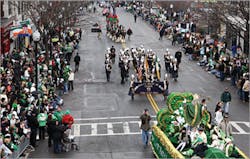Controlling the Crowds for St. Patrick's Day
When Robert Lenehan Jr. first stated with the Massachusetts Bay Transit Authority Police Department, he got quite an experience with his first St. Patrick’s Day parade.
At first it seemed his shift by the Andrew station on the parade route was a peaceful little outpost, however, it soon turned into an area where he found himself taking care of lots of issues.
“Everybody was drunk,” he said. “I made a dozen arrests and I was still calling for prisoner transports.”
Lenehan, who is now deputy chief of the patrol division for the MBTA Transit Police Department said a lot has changed since his first patrol on St. Patrick’s Day for the parade and the department and the city have worked to try and make things safer for those who want to go out and celebrate the holiday.
Boston’s St. Patrick’s Day parade is one of the largest in the country, running through the streets of South Boston in part to honor veterans by the Allied War Veterans Council. However, with thousands attending the parade it can be difficult for police to patrol, especially for MBTA, which has a stop at each end of the route, with one of the stops also being a major bus hub.
Lenehan said the parade also shuts down the four points area of the city making it more difficult for buses to get through.
“A secondary problem is the deluge of people who come through,” Lenehan said. “When the parade starts at 1 p.m., when do all the people show up? 1 p.m.”
To prepare for the event, MBTA police has a plan in place to deal with such events. Lenehan said besides the parade, there are large amounts of people who go through the system for Fourth of July events, Halloween events in Salem, Mass., and smaller regional events that draw large crowds of locals.
MBTA police will be further taxed on parade day, Lenehan said because state high school hockey tournaments are also going on at the TD Garden in Boston, so officers will also be looking to keep rowdy teenagers in check.
Lenehan said plans have been digitized and records from past year’s events are kept on hand for officers to review so they can plan for the day and how to handle people coming through and the crush of people entering stations.
One thing done to take care of some of the crowd issues is a bus has been put in at the end of the route to get stragglers, Lenehan said, which has been a great help for officers.
“I don’t know whose idea it was, but it was the greatest idea they ever came up with,” he said.
Drunkenness has also become less of an issue in recent years, Lenehan said, because the city had put stricter restrictions on bars, with undercover officers patrolling to make sure they aren’t over capacity and they’re forced to shut down early. Last year, Lenehan said he only remembered one person getting arrested and it was a minor in possession of alcohol.
“One of the greatest things is they reversed the parade route. The Broadway station is in an area where most of the bars are in Boston, so people were in a position that at the end of the parade they were going into the bars and getting three sheets to the wind,” he said. “And another one of those things — it’s not even fair to call them house parties because they’re more of just open houses — but people will invite you in left and right, so at one point in time there was an influx of people with too much to drink.”
